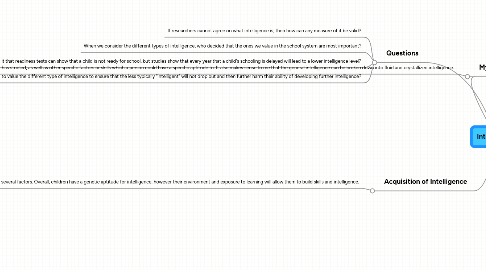Intelligence
by Jessica Owens


1. Components
1.1. General Intelligence (g)
1.1.1. Fluid Intelligence
1.1.2. Crystallized Intelligence
1.2. Specific Factors (s)
1.2.1. Gardner's Multiple Intelligences
1.2.1.1. Linguistic
1.2.1.2. Logical-mathmatical
1.2.1.3. Spatial
1.2.1.4. Musical
1.2.1.5. Bodily-kinesthetic
1.2.1.6. Interpersonal
1.2.1.7. Intrapersonal
1.2.1.8. Naturalist
1.2.2. Other factors
1.2.2.1. School-based
1.2.2.2. Culture-based
2. My Definition
2.1. Intelligence is a combination of the things you know, your ability to learn and process information, and your ability to act appropriately to complete your desired task. This looks different in each culture and ingroup. I do not have a problem with connecting each of the different theories to find a balance between them all. I believe that we do all have a general intelligence (g) as well as specific factors. Those specific factors can easily correspond with the different multiple intelligences that Gardner has studied, as well as other specific factors or skills which a person could have a specific aptitude to. It also makes sense to me that the general intelligence can be broken down into fluid and crystallized intelligence.
3. Questions
3.1. If researchers cannot agree on what intelligence is, then how can any measure of it be valid?
3.2. When we consider the different types of intelligence, who decided that the ones we value in the school system are most important?
3.3. Why is it that readiness tests can show that a child is not ready for school, but studies show that every year that a child's schooling is delayed will lead to a lower intelligence level?
3.4. What can we do to value the different type of intelligence to ensure that the less typically "intelligent" will not drop out and then further harm their ability of developing further intelligence?
4. Acquisition of Intelligence
4.1. Children acquire intelligence in a variety of ways that are influenced by several factors. Overall, children have a genetic aptitude for intelligence, however their environment and exposure to learning will allow them to build skills and intelligence.
4.1.1. Genetics
4.1.2. Environment
4.1.2.1. SES Level
4.1.2.1.1. Nutrition
4.1.2.1.2. Parent Involvement
4.1.2.2. Exposure to Toxins
4.1.2.3. Education
4.1.2.3.1. Quality
4.1.2.3.2. Attendance
4.1.2.3.3. Age of beginning
